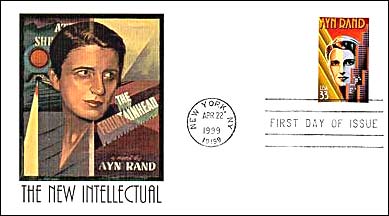Over at Think Of England, Brit has a list of things worthy of disparagement (or “meh”, as he puts it). It is a fine list, by and large, although I was not the only commenter to question his inclusion of “most soups”. Obviously the poor fellow is brainsick, at least in that part of the cranium evolution has designed for soup appreciation. Perhaps his family and pals can rally round and organise an “intervention”. It may be his only hope.
His list, however, reminded me of one of my favourite books, The Chatto Book Of Cabbages And Kings : Lists In Literature, edited by Francis Spufford. Looking it up on Amazon to find out if it is still available – it is, of course – I noted that, with splendid serendipity, it was published exactly twenty years ago today. An anniversary not quite as thrilling as the becrumblement of the Berlin Wall, but nevertheless one worth marking. So my thanks to Brit for making me think about lists.
On the other hand, I have absolutely no idea what has brought Ayn Rand swimming into my head over the last few days. I have mentioned her here, and in my comment at Think Of England, which might give readers the impression that I am somehow obsessed. It is true that I continue to work tirelessly at my monograph A Startling Number Of Anagrams Of ‘Ayn Rand’, which I am hoping to finish during the next decade. But other than that, the most interesting thing about the bonkers Objectivist is that she was a very keen stamp collector. I drew readers’ attention to this some years ago, but may as well do so again for those of you who do not spend your every waking hour trawling through the Hooting Yard Archives. While others may claim The Fountainhead or Atlas Shrugged as Ayn Rand’s greatest work, you and I know that she never surpassed her classic Why I Like Stamp Collecting.


I thought “meh” meant something closer to “worthy of indifference”. It’s the thing to say when an opinion is expected of you, but you know that forming or expressing one won’t be worth the effort. For example: “You say fluorescent bulbs are full of Socialism and poison gasses? Meh.”
Glyn : Thanks for that clarification. I must admit I was a bit hazy on the precise meaning of “meh”. However, indifference to “most soups” is almost as great a thought-crime as disparagement, so I think my substantive point holds firm.
So my thanks to Brit for making me think about lists.
Don’t mention it, glad to be of service.
As for ‘meh’, I understand the meaning to be somewhere between Frank’s notion and Glyn’s. I elaborated on this and hazarded a guess at the origins of the expression here.
When did ‘meh’ hit the streets? I first saw it written down in Spring 2005 (by a school-child, many times: it clearly had novelty value). It didn’t strike me as a ‘stayer’ … and I much prefer the Auden version.